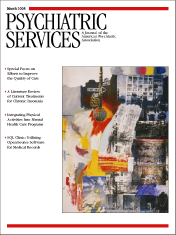A Group-Based Walking Program at a Psychiatric Rehabilitation Center
Obesity, sedentary lifestyle, hypertension, and diabetes have been among the most frequent health problems we have encountered in our nursing center, which provides integrated primary and mental health care for clients—known as "members"—of Thresholds Rehabilitation Centers. We developed a walking program to address these health risks and promote more active lifestyles.
In 2003 we introduced a group-based, moderate-intensity walking program for sedentary Thresholds members who were affiliated with the Thresholds Vocational Rehabilitation Center located on Chicago's near South Side. Participants were first screened for cardiovascular risk with a physical examination and laboratory and fitness testing. Eligible members were enrolled in the group as part of their quarterly rehabilitation center schedule. The group met three times a week for 12 weeks and was led by a case manager cross-trained to support and educate new exercisers as they became more physically active. Each participant received a personal exercise plan based on his or her fitness test, walking shoes, and a heart rate monitor to use during walking sessions to self-monitor duration and intensity.
For the first four weeks—the conditioning phase—participants walked twice a week for ten to 15 minutes; the third group meeting each week was an interactive workshop that covered benefits and barriers to exercise, getting started with exercise, and finding ways to maintain motivation. By week 12, participants were walking three times a week for 25 to 30 minutes each time in addition to warm-up, cool down, and stretching. The case manager was assisted by an advanced practice nurse from the nursing center who had expertise in walking programs, and both walked with the group each time on routes preplanned for distance, interest, and safety. A wrap-up session at the end of the 12 weeks recognized all participants for their accomplishments.The program was a preliminary study to determine the feasibility of cardiovascular risk reduction among individuals with serious mental illness through supported physical activity. Fifteen participants aged 21 to 66 years enrolled, and 13 completed the 12-week program. The average participant attended about 23 of the 30 walking sessions (76 percent) and 3.4 of the educational activities (87 percent). Walking attendance was inversely related to body mass index; obese participants were absent more often. The SF-12 Health Survey was administered before and after the 12-week program, and no change in physical or mental health was noted. Mood improved significantly (p=.02), as measured by the Profile of Mood States. Scores on the Multnomah Community Ability Scale, which measures psychosocial functioning of persons with serious and persistent mental illness living in the community, also improved (p=.02).
A walking group was added to the center's next quarterly schedule and was quickly filled. The program continues as a 12-week group for up to 15 members, which meets twice a week during the spring, summer, and fall quarters. The group includes workshops and group walking sessions led by a case manager.
The original group described here was funded by the campus research board of the University of Illinois at Chicago and the Center for Research on Cardiovascular and Respiratory Health (CRCRH) in the College of Nursing at the University of Illinois at Chicago. The CRCRH is supported by the National Institute of Nursing Research of the National Institutes of Health, grant P20-NR07812.
Dr. McDevitt is a clinical assistant professor in the department of public health, mental health, and administrative nursing at the College of Nursing of the University of Illinois at Chicago. Ms. Forest is a case manager for Thresholds Psychiatric Rehabilitation Centers. For more information about the program, contact Noel Robinson, Program Director, Thresholds South Psychiatric Rehabilitation Center, 734 West 47th Street, Chicago, Illinois 60609 (e-mail, [email protected]).



